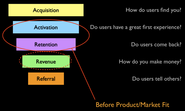-
About
- About Listly
- Community & Support
- Howto
- Chrome Extension
- Bookmarklet
- WordPress Plugin
- Listly Premium
- Privacy
- Terms
- DMCA Copyright
- © 2010-2025 Boomy Labs

 Liz Yeomans
Liz Yeomans
Listly by Liz Yeomans
Product development resources on Analytics, Metrics that Matter, and Experiments.

Marc Andreesen once said that "markets that don't exist don't care how smart you are."
Whether you're a startup founder trying to disrupt an industry, or an intrapreneur trying to provoke change from within, your biggest risk is building something nobody wants.

Use data to build a better startup faster in partnership with Geckoboard - Free Course

by Kerry Rodden
"When designing for the web, you can analyze usage data for your product and compare different interfaces in A/B tests. This is sometimes called "data-driven design", but I prefer to think of it as data- informed design - the designer is still driving, not the data."

This workshop led by Google engineer Brett Slatkin digs in to cohort analysis. He'll walk you through how he does it, show you a tool he built to simplify cohort analysis of log files, and answer your questions.

This workshop led by Optimizely CEO Dan Siroker, covers when to use A/B testing, how to implement it, and most importantly, how to measure the results. Should that button say "click here" or "learn more"? Will the layout of your homepage materially impact app downloads?

A/B testing is overhyped. It is everywhere these days. It seems like many people in our industry perceive it as a magic tool that will boost their conversions with very little effort. It's easy to get hooked with the A/B testing frenzy - the Internet is filled with success stories about how changing a stupid button color resulted in a 300% increase in conversions.

So, you've launched your MVP... congratulations! That's a huge achievement, but don't kid yourself - your v1 product is almost certainly not ready to scale into a real business. MVPs are, by definition, the minimal feature set you need to start learning with real users, and the speed at whichaaa

First, what is an actionable metric? An actionable metric is one that ties specific and repeatable actions to observed results. The opposite of actionable metrics are vanity metrics (like web hits or number of downloads) which only serve to document the current state of the product but offer no insight into how we got here or what to do next.

Vanity metrics: good for feeling awesome, bad for action. (photo source: UK Guardian) This is a guest post by serial entrepreneur Eric Ries. He was most recently co-founder and CTO of IMVU, which has more than 20 million registered users and generates $1,000,000+ in revenue per month.
One of the most significant changes in how we do product today is our use of analytics. Any capable product leader today is expected to be comfortable with data, and understand how to leverage analytics to learn and improve quickly.
